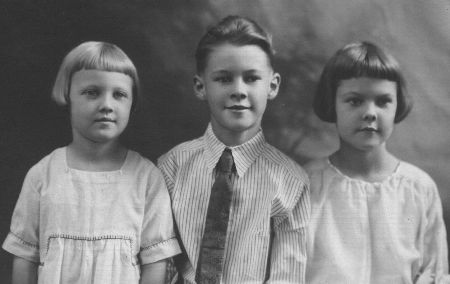
Lucile, Leon, and Mable, about 1923
On the most basic level, there is of course gratitude for my very existence and that of my sister and each of my six brothers. Thanks to our lives, in turn, the extended family now also includes my wife, Valerie, a brother-in-law, sisters-in-law, and many nephews, nieces, grandnephews, and grandnieces.
My parents were part of "the greatest generation," folks who dealt with the world's worst economic depression and the Dust Bowl in the 1930s and went on to join the mammoth World War II and Korean War struggles against tyranny and aggression in the 1940s and 1950s and then through several succeeding decades took up the Cold War campaign of "detente" with the Soviet Union as well, ultimately besting this adversary too.
 Lucile, Leon, and Mable, about 1923 |
These were not times for sensitivity, appeasement, or "nice" forms of confrontation. They called for a tough-minded, often stoic steadfastness of purpose against great odds, a favorable outcome never assured.
My father tried a number of ventures in his youth, then served in the U.S. Army, Border Patrol, and Air Force for close to 30 years. With both depression era privations and prior relatives' and teachers' accomplishments in mind, he and Julia, my mom, were brilliantly frugal during most of these their financially prosperous years and invested wisely so that, from being nearly penniless and living with parents in the late 1930s, Leon was able to retire in 1960 at age 48, despite their having eight kids, all still living at home at the time. Though I would leave for college a little over a year later, my siblings all needed our folks' provision of room, board, transport, medical care, and clothes for a number of years to come.
The time following Dad's retirement and after I had left for university courses was by all accounts not an easy one for my sister and brothers, yet all, like me, grew up strong and healthy, intelligent, and capable of making their own individual ways in the world.
As I have gained insight with advancing years, my father, in some ways a hard man, has better come into focus, and the picture I see of him now is far more human and worthy of respect than I had recognized two or three score years ago.
His relationship with his own dad was not the best. Papa Frank, while later affable and amusing with his grandchildren (like me), could be severe and judgmental with his own offspring. As a preacher, helping to found several fundamentalist congregations around the country, he had little tolerance for Dad's growing intellectual questioning of dogmatic religious tenets. Even more than might generally have been the case between a father and his oldest child and only son, Papa Frank must have felt compelled to insist on Leon toeing the doctrinaire line, and, when this attitude was not effective, have been rejecting.
Dad's "male authority" was also undermined in being surrounded much of the time by rather independent sisters, the older two of whom were competitive, uncooperative, and enjoyed teasing him, and by a mother who liked things in her home to be always correct and "just so." No room was left for a young man's free spirit, even less so for my future dad to feel he had any others' support if he would "march to the beat of a different drummer."
The sister whom he really loved, Wilma, was the youngest of three girls in his birth family. He was 12 and she 5 when she died from congestive heart failure. In that hostile environment, he must have felt then that he had lost his only friend. Even to have admitted his misery would probably have been used against him.
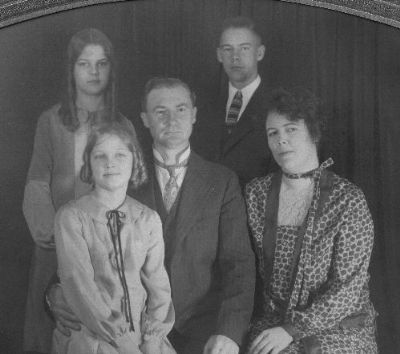 Mabel, Leon, Lucile, Papa Frank, and Mama Pearl, about 1930 |
Dad apparently reacted with self-righteousness, believing she had brought it on herself. Overall, his response was one of forcefully endorsing only pragmatic, analytical realism combined with the compulsive perfectionism that characterized much of his adult life. He never went along with either what he saw as her fantasies or with her and her older sister's persistent rebellions against his directions, ideas, or attempts at having any satisfaction in life. He must have felt the only way to know a sense of real personal pride or pleasure would have been to completely create and control his own more friendly environment, a family he "owned," so to speak, even if his wife, Julia, did not completely go along with his outlook on that!
Trained as a military manager, intelligence analyst, and an interrogator of war prisoners, Leon had difficulties relating in a "warm and fuzzy" way till, much later in life, he began to adapt to his new role as grandpa, one he eventually took to, though, with obvious delight.
Having "psychoanalyzed" the fellow in this way, so I might better "walk in his shoes" and see him in a sympathetic context, I find I am not looking on him at all as the "monster" he occasionally seemed when we were growing up. Does this mean I excuse his flaws? Not exactly. I see him though more with my eyes wide open as neither angel nor ogre but, like most of us, somewhere between, a guy who did the best he could, got some things wrong - and we can surely learn even from these errors - but also quite a few right.
I think a good way to show what I mean is to say he was similar to a lead character played by Robert Duvall in a 1979 movie, "The Great Santini," about a military officer struggling to be the kind of father and husband everyone wanted him to be, not quite making it, yet in the process being so darned and genuinely real that one's heart goes out to him.
With all that preamble, let me note a few things now about this tough yet deeply feeling man, things that are not faint praise but represent a serious salute to the neat individual who was not merely my father but in important ways my mentor as well.
Here then are 100 of the many "How to" things I have learned by example or demonstration from my dad, Leon, who did them all long before I could:
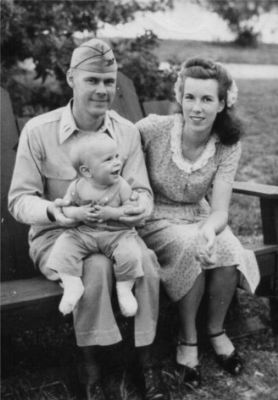 Leon and Julia with Larry, about 1944 |
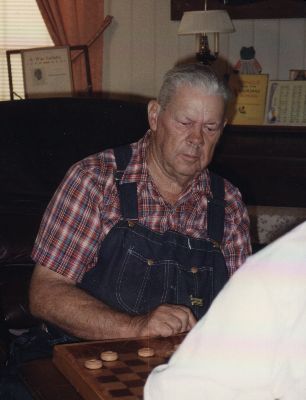 Leon playing checkers with an unknown opponent at the Rockin' B Ranch home, around 1989 |
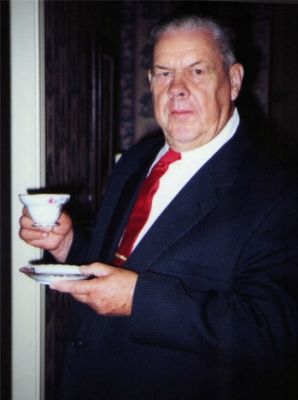 Leon in a Rockin' B kitchen doorway, about 1991 |
Not bad, Dad. Happy one hundredth!